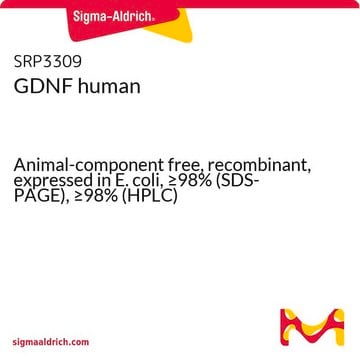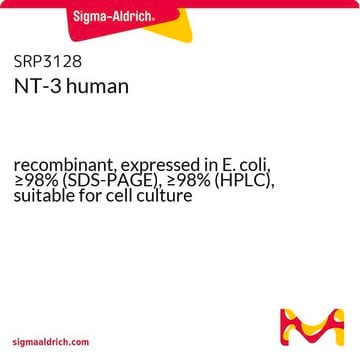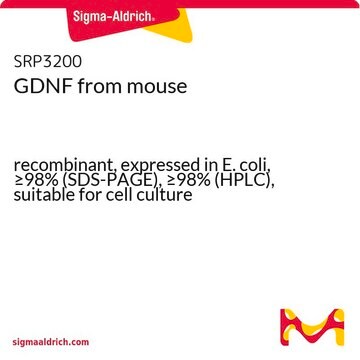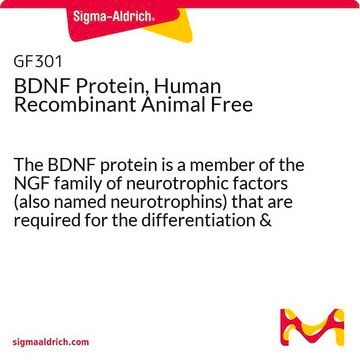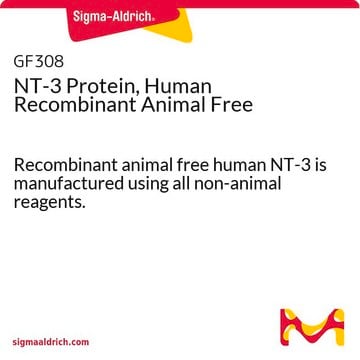GF322
GDNF, Human Recombinant
Animal Free
Synonym(s):
Glial Derived Neurotrophic Factor
Sign Into View Organizational & Contract Pricing
All Photos(1)
About This Item
UNSPSC Code:
12352202
eCl@ss:
32160405
NACRES:
NA.77
Recommended Products
Related Categories
General description
GDNF is a disulfide-linked homodimeric neurotrophic factor structurally related to Artemin, Neurturin and Persephin. These proteins belong to the cysteine-knot superfamily of growth factors that assume stable dimeric protein structures. GDNF signals through a multicomponent receptor system, composed of a RET and one of the four GFRα (α1-α4) receptors. GDNF specifically promotes dopamine uptake and survival and morphological differentiation of midbrain neurons. Using Parkinson’s disease mouse model, GDNF has been shown to improve conditions such as bradykinesia, rigidity, and postural instability.
The functional human GDNF ligand is a disulfide-linked homodimer, of two 15 kDa polypeptide chains called monomers. Each monomer contains seven conserved cysteine residues, one of which (Cys 101) is used for inter-chain disulfide bridging and the others are involved in intramolecular ring formation known as the cysteine knot configuration.
The functional human GDNF ligand is a disulfide-linked homodimer, of two 15 kDa polypeptide chains called monomers. Each monomer contains seven conserved cysteine residues, one of which (Cys 101) is used for inter-chain disulfide bridging and the others are involved in intramolecular ring formation known as the cysteine knot configuration.
Product Source: Protein is expressed in E.coli.
The protein is manufactured without the use of any animal products/reagents and is considered Animal-Free and can be used in protocols where possible transmisson of animal viruses and contamination must be avoided.
The protein is manufactured without the use of any animal products/reagents and is considered Animal-Free and can be used in protocols where possible transmisson of animal viruses and contamination must be avoided.
Application
Research Category
Stem Cell Research
Stem Cell Research
Research Sub Category
Growth Factors & Receptors
Growth Factors & Receptors
Quality
The ED50 was determined by the proliferation of rat C6 cells is ≤ 0.1 µg/ml, corresponding to a specific activity of ≥ 1 x 10^5 units/mg.
Physical form
Product is presented in 10 mM Sodium Citrate + 150 mM NaCl and is filtered through a 0.2 micron filter before lyophilization.
Storage and Stability
Store at -20°C for up to 4 months from date of receipt Centrifuge the vial prior to opening.
Reconstitute in water to a concentration of 0.1-1.0 mg/ml. Do not vortex. For extended storage, it is recommended to further dilute in a buffer containing a carrier protein and store in working aliquots at -20°C.
Reconstitute in water to a concentration of 0.1-1.0 mg/ml. Do not vortex. For extended storage, it is recommended to further dilute in a buffer containing a carrier protein and store in working aliquots at -20°C.
Disclaimer
Unless otherwise stated in our catalog or other company documentation accompanying the product(s), our products are intended for research use only and are not to be used for any other purpose, which includes but is not limited to, unauthorized commercial uses, in vitro diagnostic uses, ex vivo or in vivo therapeutic uses or any type of consumption or application to humans or animals.
Signal Word
Warning
Hazard Statements
Precautionary Statements
Hazard Classifications
Eye Irrit. 2
Storage Class Code
11 - Combustible Solids
WGK
WGK 1
Certificates of Analysis (COA)
Search for Certificates of Analysis (COA) by entering the products Lot/Batch Number. Lot and Batch Numbers can be found on a product’s label following the words ‘Lot’ or ‘Batch’.
Already Own This Product?
Find documentation for the products that you have recently purchased in the Document Library.
Vladimir Mashanov et al.
PloS one, 15(10), e0240235-e0240235 (2020-10-06)
It is often critical to improve the limited regenerative capacity of the peripheral nerves and direct neural growth towards specific targets, such as surgically implanted bioengineered constructs. One approach to accomplish this goal is to use extrinsic neurotrophic factors. The
Melissa Hingorani et al.
Frontiers in neuroscience, 16, 994735-994735 (2022-11-11)
Vertebrate brains have a dual structure, composed of (i) axons that can be well-captured with graph-theoretical methods and (ii) axons that form a dense matrix in which neurons with precise connections operate. A core part of this matrix is formed
Our team of scientists has experience in all areas of research including Life Science, Material Science, Chemical Synthesis, Chromatography, Analytical and many others.
Contact Technical Service


